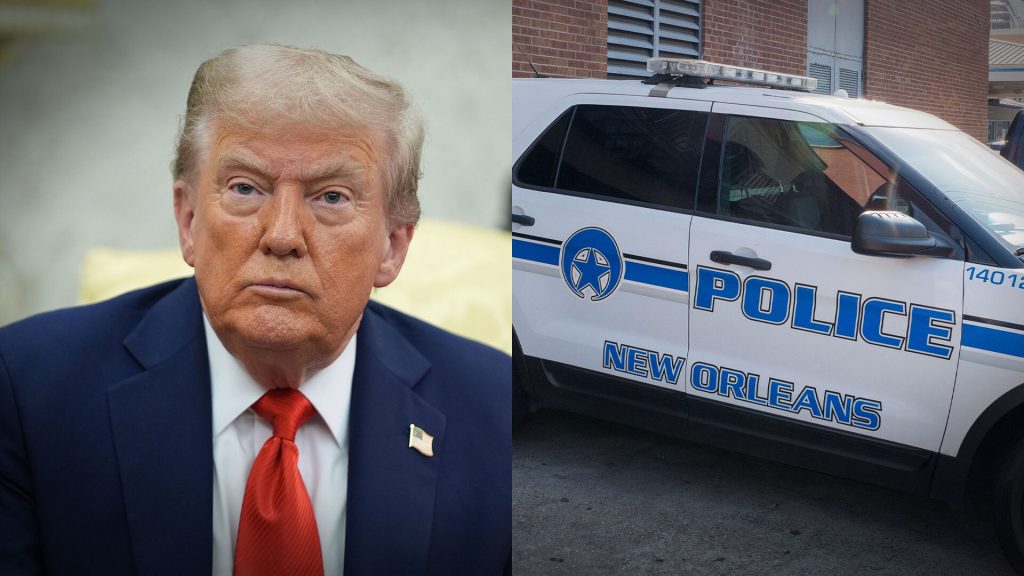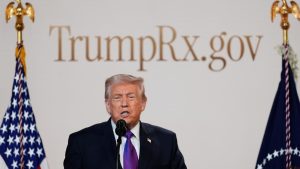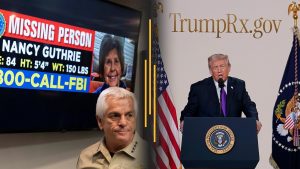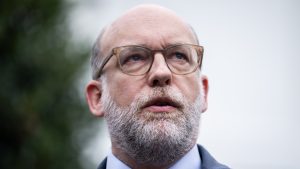With governor’s invitation, New Orleans is latest in Trump’s crime-fighting push

President Donald Trump has floated the idea of sending National Guard troops to New Orleans after Louisiana Gov. Jeff Landry, a Republican, requested help with fighting crime. Trump’s move comes a day after he promised a similar move in Chicago, to the chagrin of Illinois lawmakers.
Trump brought up deploying the National Guard in New Orleans during an Oval Office bilateral meeting with Polish President Karol Nawrocki on Wednesday. He thought of Louisiana after a reporter questioned him about his plans to deploy troops and other federal law enforcement to Chicago. He told the room that he’s more interested in helping cities and states whose leaders request assistance, but he still wanted Illinois Gov. JB Pritzker, a Democrat, to ask for troops.
“We’re pretty much waiting until we get asked,” Trump said. That differed from his statement on Tuesday, in which he said he would send troops to Chicago, but he didn’t specify when.
So far, Trump has either deployed or eyed deploying federal troops to Los Angeles, Washington, D.C., Chicago, New Orleans and New York City.
Pritzker wrote on X Wednesday that he won’t request the National Guard to be deployed in Chicago.
However, federal agencies are moving forward with plans for more intensive immigration enforcement in Chicago after the Pentagon authorized the U.S. Department of Homeland Security to use the nearby Naval Station Great Lakes as a hub for immigration operations, The Washington Post reported Thursday. The Post speculated the base could also house National Guard or active-duty military soldiers should Trump order patrols in Chicago.
DHS Secretary Kristi Noem sought permission last month to have DHS personnel use the base. Noem also confirmed that U.S. Immigration and Customs Enforcement will expand its operations in Chicago a day after Mayor Brandon Johnson signed an executive order establishing several measures to limit cooperation by Chicago police with federal troops.
Federal agents to NOLA
Louisiana’s Landry, who won the governor’s office with Trump’s endorsement, wrote on X Wednesday that his state would welcome help from “New Orleans to Shreveport.”
“We’re going to be going to maybe Louisiana,” Trump said. “You have New Orleans, which has a crime problem, and we’re going to be straightening that out in about two weeks.”
He noted that it will be easier to deal with crime in New Orleans than in Washington, D.C. Trump also reiterated that he’s open to sending federal troops to Chicago should local leaders request it. That’s an approach the White House will follow for future deployments, he said.
New Orleans is a different situation, as the Democrat-run city rests in a Republican-run state. In a joint statement issued on Wednesday, the city and the New Orleans Police Department thanked the federal government for its assistance in addressing crime.
“New Orleans is an international city, welcoming visitors from all over the world every day of the year,” the statement read. “Our federal and state partnerships have played a significant role in ensuring public safety, particularly during special events for a world-class city.”
Mayoral candidates oppose plans
Not all leaders in New Orleans are on board with Trump’s plan. Mayoral candidates have denounced the plan, denying that the city needs federal troops.
City Council President Helena Moreno, who’s running for mayor, said on Facebook that the city has seen an “unprecedented” crime reduction. She accused Trump of politicizing public safety and said Republican-led cities with more severe crime rates aren’t being targeted.
The news site NOLA.com reported on July 13 that New Orleans appears to have shed its “Murder Capital” moniker after the New Orleans Police shared data showing the city is on track for its safest year since the early 1970s.
Homicides dropped from 266 in 2022 to 124 in 2024, according to police data. As of Aug. 30, police reported 73 homicides so far in 2025, including the deadly New Year’s Day attack that claimed 14 lives.
Other mayoral candidates, such as City Council member Oliver Thomas and state Sen. Royce Duplessis, agreed with Moreno and recalled the tensions that arose when the National Guard patrolled the city’s streets after Hurricane Katrina in 2005.
The city’s election is in November.
“History has shown us that federal troop deployments do not solve crime; they only create tension, chaos, and distrust,” Duplessis wrote on Facebook.
The post With governor’s invitation, New Orleans is latest in Trump’s crime-fighting push appeared first on Straight Arrow News.





